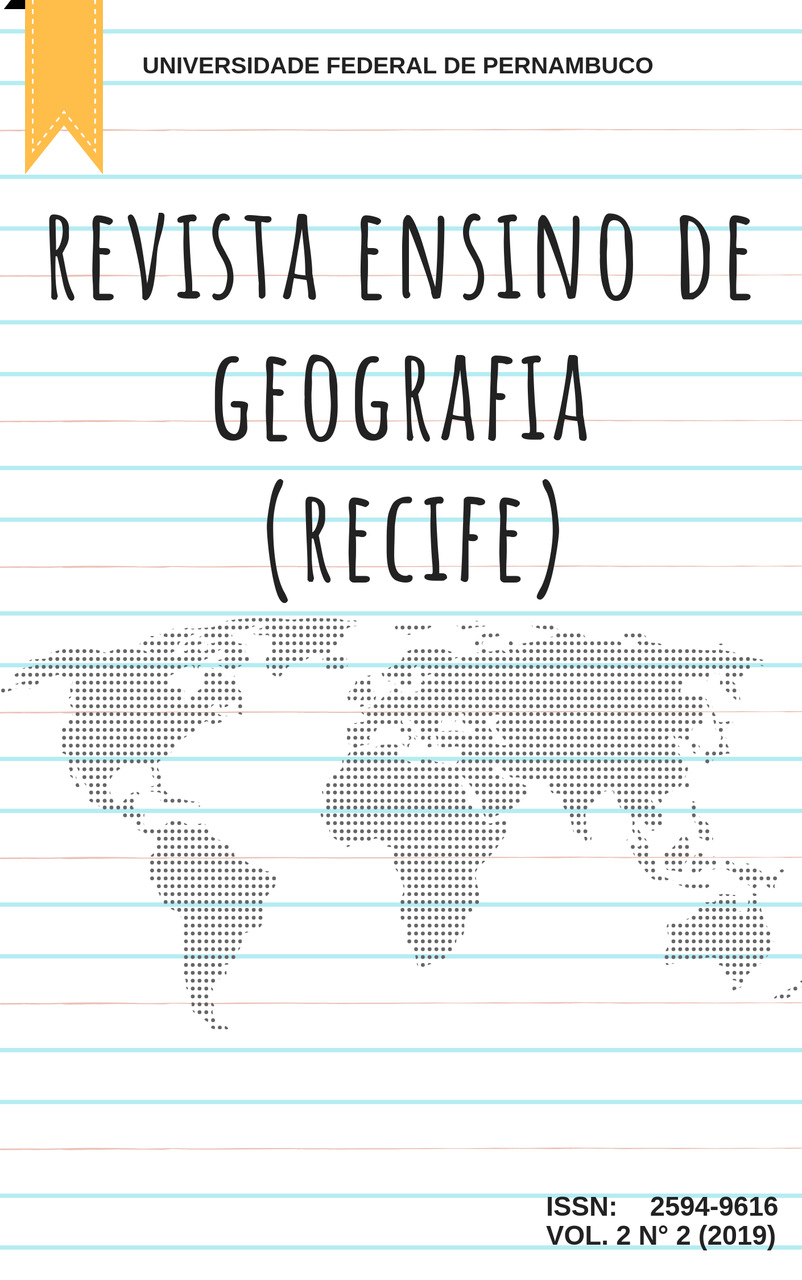Theoretical foundations for the development of geographical reaction in basic education
DOI:
https://doi.org/10.51359/2594-9616.2019.240483Keywords:
Teaching, Reasoning, GeographicaAbstract
Geographical reasoning is a cognitive process that can be developed by the Geography teacher in both higher and lower education. In basic education, the purpose is to develop the student to interpret and act in space practices. Nevertheless, this expression is not yet consensual among geographers and is in a state of probation, since it began to appear in the discussions of School Geography mainly from the decade 1990. Therefore, the objective of this work is to discuss theoretical indications for the development of such reasoning in basic education. For this we used the bibliographic research in which allowed us to reach the following results; the structural concepts (space, landscape, territory) and the logical principles (scale, location, delimitation, connection) are the theoretical bases for the development of the geographic reasoning in basic education. Therefore, geographic reasoning is a cognitive process that enables the mobilization of abilities to interpret and act in spatial practices in a critical-reflective way. Its development in the teaching of Geography in basic education requires the scientific foundations of Geography as a science
References
______. Bases teórico-metodológicas da Geografia: uma referência para a formação e a prática de ensino. In: CAVALCANTI, L. S. (org.). Formação de professores: concepções e práticas em Geografia. Goiânia: Vieira, 2006.
CORRÊA, Roberto Lobato. Espaço: um conceito-chave da Geografia. In: CASTRO, Iná Elias de et al. Geografia: conceitos e temas. 15.ed. Rio de Janeiro: Bertrand Brasil, 2012.
FILIZOLA, Roberto. Didática da Geografia: proposições metodológicas e conteúdos entrelaçados com a avaliação. Curitiba: Base Editorial, 2009.
LACOSTE, Yves. Geografia isso serve, em primeiro para fazer a guerra; tradução Maria Cecilia França.19.ed. Campinas, SP: Papirus, 2012.
MORAES, Antônio Carlos Robert de. Geografia: pequena história crítica. 20. ed. São Paulo: Annablume, 2005.
MORAES, Loçandra Borges de. Raciocínio geográfico, cartografia temática e ensino de cidade. Boletim Paulista de Geografia, v. 99, p. 312-331, 2018.
MOREIRA, Ruy. Pensar e ser em Geografia: ensaios de história, epistemologia e ontologia do espaço geográfico. 2.ed. São Paulo: Editora Contexto, 2015.
PIRES, Lucineide Mendes; ALVES, Adriana Olivia. Revisitando os conceitos geográficos. In. SILVA, Eunice Isaias da; PIRES, Lucineide Mendes (Org.) Desafios da didática de Geografia. Goiânia: Editora Puc Goiás, 2013.
RAFFESTIN, Claude. Por uma Geografia do poder. Tradução de Maria Cecília França. São Paulo: Editora Ática, 1993.
SAVIANI, Dermeval. Política educacional no Brasil após a Ditadura Militar. Revista HISTEDBR On-line, v. 18, n. 2, p. 291-304, 2018.
SILVA, Patrícia Assis; ROQUE ASCENÇÃO, Valéria de Oliveira Roque; VALADÃO, Roberto Célio. Por uma construção do raciocínio geográfico para além do pensamento espacial (Spatial Thinking). In: 5º Colóquio Internacional da Rede Latino-americana de Investigadores de Didática de Geografia, 2018, Pirenópolis. Anais ... Goiânia: LEPEG, 2018.
SANTOS, Milton. A natureza do espaço; técnica e tempo. Razão e Emoção. 4.ed. São Paulo: Editora da Universidade de São Paulo, 2014.
VIGOTSKY, Lev Semenovich. A construção do pensamento e da Linguagem. Tradução Paulo Bezerra. 2. ed. São Paulo: Editora Martins Fontes, 2009.
YOUNG, Michael. Para que servem as escolas?. Educação & Sociedade, v. 28, n. 101, 2007.
Downloads
Published
How to Cite
Issue
Section
License
Copyright (c) 2021 Daniel Rodrigues Silva Luz Neto

This work is licensed under a Creative Commons Attribution 4.0 International License.
Authors who publish with this journal agree to the following terms:- Authors retain copyright and grant the REVISTA ENSINO DE GEOGRAFIA (RECIFE) right of first publication with the work simultaneously licensed under a Creative Commons Attribution NonCommercial International 4.0 (CC BY-NC) that allows others to share the work with an acknowledgement of the work's authorship and initial publication in this journal.
- Authors are able to enter into separate, additional contractual arrangements for the non-exclusive distribution of the journal's published version of the work (e.g., post it to an institutional repository or publish it in a book), with an acknowledgement of its initial publication in this journal.
- Authors are permitted and encouraged to post their work online (e.g., in institutional repositories or on their website) prior to and during the submission process, as it can lead to productive exchanges, as well as earlier and greater citation of published work.



